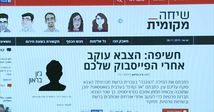24 may 2017

Facebook CEO Mark Zuckerberg’s company was the target of a failed lawsuit by an Israeli group with ties to the spy agency Mossad, over alleged Palestinian “incitement.”
A US federal court in New York court has ruled that Facebook cannot be held liable for its users’ activity.
Israeli lawfare group Shurat HaDin filed a $1 billion lawsuit last July, alleging that Facebook violates the Anti-Terrorism Act by serving as a platform for Hamas and “knowingly … facilitat[ing] this terrorist group’s ability to communicate, recruit members, plan and carry out attacks and strike fear in its enemies.”
Shurat HaDin has strong links to Israel’s Mossad spy agency.
In dismissing the case on 18 May, US District Judge Nicholas Garaufis upheld Facebook’s argument that the company was protected by the Communications Decency Act, which says certain internet services are not liable for content created by a third party.
The immunity this law extends to Facebook is based on the idea that such internet companies are not the publishers or speakers of the content under question, and therefore cannot be held liable for its alleged harm.
New legal strategy failsShurat HaDin’s case was filed on behalf of the American families of five individuals who died – and in one case survived – in attacks allegedly carried out by Hamas.
The case was among the first to invoke the Anti-Terrorism Act to argue that an internet company is liable for its users’ activity.
The Anti-Terrorism Act allows US citizens to file civil suits against organizations and people accused of providing material support to groups designated as “foreign terrorist organizations” by the US government.
In order to invoke the law, plaintiffs must show that the alleged material support was in the service of a designated terrorist group. The US designated Hamas as a terrorist organization in the 1990s.
Earlier lawsuit also dismissedIn the same ruling, Judge Garaufis also dismissed an earlier lawsuit filed by Shurat HaDin in 2015 on behalf of 20,000 Israelis, who claimed they were threatened by potential violence that was being planned or incited on Facebook.
The court dismissed this lawsuit on the basis that the plaintiffs failed to establish an actual injury that could be connected to Facebook’s conduct.
Nitsana Darshan-Leitner, the founder of Shurat HaDin, said her group will appeal the ruling.
“We believe there is a fatal mistake in their ruling because the court totally did not address the issue of aiding and abetting terrorism,” she said following the ruling last week.
In its lawsuit, Shurat HaDin claimed Facebook’s approach to regulating content was inconsistent and piecemeal, arguing that Hamas should not be allowed to operate any pages on Facebook.
Censorship concernsFacebook has been the target of an intense campaign by the Israeli government. Last year, public security minister Gilad Erdan charged that the blood of Israelis killed by Palestinians in violence related to Israel’s military occupation in the West Bank is “on the hands of Facebook.”
Along with its lawsuits, Shurat HaDin sponsored a campaign, which included plans for a billboard opposite Facebook CEO Mark Zuckerberg’s home, personally implicating him in conflict-related deaths.
Over the weekend, The Guardian published leaked information on how Facebook monitors and censors activity on its social media platform. The exposé portrays the company as struggling to implement consistent censorship rules for categories of content that can be hard to define, including so-called terrorism, pornography and threats of violence.
The Guardian’s report suggests “terrorism” is one of the trickiest topics for Facebook to monitor.
The company has been accused of censoring political activity, especially by Palestinians and Kashmiris, in the name of clamping down on terrorist recruitment and propaganda.
Facebook has defended its censorship of content related to Kashmir, where the Indian government is waging a brutal military campaign against protesters, by stating: “There is no place on Facebook for content that praises or supports terrorists, terrorist organizations or terrorism.”
Facebook is reportedly developing an artificial intelligence mechanism “to distinguish between news stories about terrorism and actual terrorist propaganda.”
A US federal court in New York court has ruled that Facebook cannot be held liable for its users’ activity.
Israeli lawfare group Shurat HaDin filed a $1 billion lawsuit last July, alleging that Facebook violates the Anti-Terrorism Act by serving as a platform for Hamas and “knowingly … facilitat[ing] this terrorist group’s ability to communicate, recruit members, plan and carry out attacks and strike fear in its enemies.”
Shurat HaDin has strong links to Israel’s Mossad spy agency.
In dismissing the case on 18 May, US District Judge Nicholas Garaufis upheld Facebook’s argument that the company was protected by the Communications Decency Act, which says certain internet services are not liable for content created by a third party.
The immunity this law extends to Facebook is based on the idea that such internet companies are not the publishers or speakers of the content under question, and therefore cannot be held liable for its alleged harm.
New legal strategy failsShurat HaDin’s case was filed on behalf of the American families of five individuals who died – and in one case survived – in attacks allegedly carried out by Hamas.
The case was among the first to invoke the Anti-Terrorism Act to argue that an internet company is liable for its users’ activity.
The Anti-Terrorism Act allows US citizens to file civil suits against organizations and people accused of providing material support to groups designated as “foreign terrorist organizations” by the US government.
In order to invoke the law, plaintiffs must show that the alleged material support was in the service of a designated terrorist group. The US designated Hamas as a terrorist organization in the 1990s.
Earlier lawsuit also dismissedIn the same ruling, Judge Garaufis also dismissed an earlier lawsuit filed by Shurat HaDin in 2015 on behalf of 20,000 Israelis, who claimed they were threatened by potential violence that was being planned or incited on Facebook.
The court dismissed this lawsuit on the basis that the plaintiffs failed to establish an actual injury that could be connected to Facebook’s conduct.
Nitsana Darshan-Leitner, the founder of Shurat HaDin, said her group will appeal the ruling.
“We believe there is a fatal mistake in their ruling because the court totally did not address the issue of aiding and abetting terrorism,” she said following the ruling last week.
In its lawsuit, Shurat HaDin claimed Facebook’s approach to regulating content was inconsistent and piecemeal, arguing that Hamas should not be allowed to operate any pages on Facebook.
Censorship concernsFacebook has been the target of an intense campaign by the Israeli government. Last year, public security minister Gilad Erdan charged that the blood of Israelis killed by Palestinians in violence related to Israel’s military occupation in the West Bank is “on the hands of Facebook.”
Along with its lawsuits, Shurat HaDin sponsored a campaign, which included plans for a billboard opposite Facebook CEO Mark Zuckerberg’s home, personally implicating him in conflict-related deaths.
Over the weekend, The Guardian published leaked information on how Facebook monitors and censors activity on its social media platform. The exposé portrays the company as struggling to implement consistent censorship rules for categories of content that can be hard to define, including so-called terrorism, pornography and threats of violence.
The Guardian’s report suggests “terrorism” is one of the trickiest topics for Facebook to monitor.
The company has been accused of censoring political activity, especially by Palestinians and Kashmiris, in the name of clamping down on terrorist recruitment and propaganda.
Facebook has defended its censorship of content related to Kashmir, where the Indian government is waging a brutal military campaign against protesters, by stating: “There is no place on Facebook for content that praises or supports terrorists, terrorist organizations or terrorism.”
Facebook is reportedly developing an artificial intelligence mechanism “to distinguish between news stories about terrorism and actual terrorist propaganda.”
10 may 2017

Pizza Hut International has apologized for an advertisement posted on its Israeli franchise’s Facebook page making fun of Palestinian prisoners, who have been on hunger strike since April 17.
Its apology was published on Tuesday on its Lebanese franchise’s Facebook account.
“Pizza Hut International apologizes for any offence caused by a recent post on Pizza Hut Israel’s Facebook page,” the post read.
“It was completely inappropriate and does not reflect the values of our brand. The local franchisee in the country removed it immediately and the relationship with the agency that posted it was terminated, and we truly regret any hurt this may have caused,” it added.
The Pizza Hut franchise in Israel recently posted on its Facebook page a screenshot taken from a footage released by the Israeli prison authority, claiming that the leader of the strike Marwan Barghouthi was eating secretly in his cell, and provided it with a caption reading in Hebrew, “Barghouthi, if you are no longer on hunger strike, why not eat pizza instead?”
Shortly after the advertisement was uploaded, Palestinian and Arab social media users started criticizing the pizza chain. Many even called for a boycott of Pizza Hut.
Its apology was published on Tuesday on its Lebanese franchise’s Facebook account.
“Pizza Hut International apologizes for any offence caused by a recent post on Pizza Hut Israel’s Facebook page,” the post read.
“It was completely inappropriate and does not reflect the values of our brand. The local franchisee in the country removed it immediately and the relationship with the agency that posted it was terminated, and we truly regret any hurt this may have caused,” it added.
The Pizza Hut franchise in Israel recently posted on its Facebook page a screenshot taken from a footage released by the Israeli prison authority, claiming that the leader of the strike Marwan Barghouthi was eating secretly in his cell, and provided it with a caption reading in Hebrew, “Barghouthi, if you are no longer on hunger strike, why not eat pizza instead?”
Shortly after the advertisement was uploaded, Palestinian and Arab social media users started criticizing the pizza chain. Many even called for a boycott of Pizza Hut.
27 apr 2017
|
|
Mass detentions of over 400 Palestinians were the result of a computer algorithm based on their social media usage, explains TRNN’s Shir Hever.
Shir Hever is an Economist working at The Real News Network. His economic research focuses on Israeli occupation of the Palestinian territory; international aid to the Palestinians and to Israel; the effects of the Israeli occupation of the Palestinian territories on the Israeli economy; and the boycott, divestment and sanctions campaigns against Israel. His first book: Political Economy of Israel’s Occupation: Repression Beyond Exploitation, was published by Pluto Press. |
21 apr 2017

Israeli forces reportedly detained a 22-year-old Palestinian woman from occupied East Jerusalem, for alleged “incitement” on her personal Facebook page.
According to Ma’an News Agency, Israeli media reported that the woman would be presented to an Israeli court on Thursday, to extend her detention following her interrogation.
Earlier this week, Israeli news daily Haaretz reported that Israeli forces have detained at least 400 Palestinians in less than a year over social media activity, citing sources from the Israeli army and Israel’s internal security service the Shin Bet, with only “some” of the detainees having faced trial.
Previous reports indicated a lesser rate of so-called Facebook arrests, saying 400 were detained over the last two-year period. Meanwhile, the Arab Center for Social Media Advancement 7amleh said in January that among these, only 200 Palestinians were involved in court cases.
According to the Haaretz report published Sunday, which lauded the detention campaign as an “impressive achievement,” the Israeli army alleged they had stopped 2,200 Palestinians “at various stages of planning and preparing for attacks, mostly stabbings and car rammings,” through detentions based intelligence gathered on the internet.
Haaretz claimed — as Israeli leadership has numerous times since a wave of violence in the fall of 2015 appeared to ebb over the past year — that the severe security measures have succeeded in reducing a the trend of small-scale knife and car ramming attacks against Israelis.
Palestinians have instead pointed chiefly to the frustration and despair brought on by Israel’s nearly 50-year military occupation of the Palestinian territory and the absence of a political horizon as reasons for the outbreak of violence, while analysts have dismissed the Israeli narrative of “lone wolf” assailants under the influence of online incitement as overly simplistic.
Furthermore, despite boasts by Israeli Prime Minister Benjamin Netanyahu that attribute the decrease in violence to “the (Israeli) government’s strong, responsible and methodical policy,” the Palestinian Center for Policy and Survey Research found in a poll last year that support for stabbing attacks declined “due, it seems, to a rising perception in its inefficacy.”
Many Palestinians have also pointed out that Israeli violence has continued to shape everyday life, regardless of any recent “upticks” in clashes or attacks.
Meanwhile, suppression of Palestinian freedom of expression has seen bookstores shuttered, activists, journalists, novelists, and poets detained, while a wider security crackdown in the form of large-scale punitive measures in the occupied West Bank has been branded as collective punishment by rights groups and international organizations.
According to Ma’an News Agency, Israeli media reported that the woman would be presented to an Israeli court on Thursday, to extend her detention following her interrogation.
Earlier this week, Israeli news daily Haaretz reported that Israeli forces have detained at least 400 Palestinians in less than a year over social media activity, citing sources from the Israeli army and Israel’s internal security service the Shin Bet, with only “some” of the detainees having faced trial.
Previous reports indicated a lesser rate of so-called Facebook arrests, saying 400 were detained over the last two-year period. Meanwhile, the Arab Center for Social Media Advancement 7amleh said in January that among these, only 200 Palestinians were involved in court cases.
According to the Haaretz report published Sunday, which lauded the detention campaign as an “impressive achievement,” the Israeli army alleged they had stopped 2,200 Palestinians “at various stages of planning and preparing for attacks, mostly stabbings and car rammings,” through detentions based intelligence gathered on the internet.
Haaretz claimed — as Israeli leadership has numerous times since a wave of violence in the fall of 2015 appeared to ebb over the past year — that the severe security measures have succeeded in reducing a the trend of small-scale knife and car ramming attacks against Israelis.
Palestinians have instead pointed chiefly to the frustration and despair brought on by Israel’s nearly 50-year military occupation of the Palestinian territory and the absence of a political horizon as reasons for the outbreak of violence, while analysts have dismissed the Israeli narrative of “lone wolf” assailants under the influence of online incitement as overly simplistic.
Furthermore, despite boasts by Israeli Prime Minister Benjamin Netanyahu that attribute the decrease in violence to “the (Israeli) government’s strong, responsible and methodical policy,” the Palestinian Center for Policy and Survey Research found in a poll last year that support for stabbing attacks declined “due, it seems, to a rising perception in its inefficacy.”
Many Palestinians have also pointed out that Israeli violence has continued to shape everyday life, regardless of any recent “upticks” in clashes or attacks.
Meanwhile, suppression of Palestinian freedom of expression has seen bookstores shuttered, activists, journalists, novelists, and poets detained, while a wider security crackdown in the form of large-scale punitive measures in the occupied West Bank has been branded as collective punishment by rights groups and international organizations.
18 apr 2017

Israeli Intelligence and Transportation Minister Yisrael Katz demanded on Tuesday the execution of convicted Palestinian prisoners.
Katz tweeted Monday evening that Marwan al-Barghouti should have been given the death penalty instead of been sentenced to life imprisonment, where he is currently leading a hunger strike to improve prisoners detention conditions.
Katz calls on Israeli leaders including Army Minister Avigdor Lieberman to vote for enforcing the law bill that allows the death penalty to be applied against Palestinian prisoners.
On Monday, hundreds of Palestinian prisoners began a mass hunger strike scheduled to coincide with Palestinian Prisoner Day, an annual event held in solidarity with the more than 6,000 Palestinian prisoners incarcerated in Israeli jails.
Katz tweeted Monday evening that Marwan al-Barghouti should have been given the death penalty instead of been sentenced to life imprisonment, where he is currently leading a hunger strike to improve prisoners detention conditions.
Katz calls on Israeli leaders including Army Minister Avigdor Lieberman to vote for enforcing the law bill that allows the death penalty to be applied against Palestinian prisoners.
On Monday, hundreds of Palestinian prisoners began a mass hunger strike scheduled to coincide with Palestinian Prisoner Day, an annual event held in solidarity with the more than 6,000 Palestinian prisoners incarcerated in Israeli jails.
16 apr 2017

The Israeli security services arrested 400 Palestinians since October 2015 for their social media posts, especially those published on Facebook.
The Israeli newspaper Haaretz said in a report on Sunday that the Israeli security services imposed strict censorship on social media websites to identify those who have intentions to carry out attacks.
The Israel Security Agency (Shin Bet) developed, in cooperation with the intelligence services, a data bank based on an automatic sorting of the Palestinian posts and comments on social media.
The Israeli security services arrested this number of Palestinians after an in-depth examination and monitoring of the posts of 2,200 Palestinians who were accused of having motives that suggest the possibility of carrying out attacks.
The Hebrew website NRG said that the Israeli authorities consider Silwad town, near Ramallah city, as the city which has the largest number of would-be attackers.
The website pointed out, quoting a senior Israeli officer whose identity was not disclosed, that the Israeli army and the intelligence services are following up the inciting posts and working to stop the flow of money to Silwad where anti-Israel armed attacks are being allegedly planned and confiscate the equipment allegedly used for manufacturing weapons.
The Israeli newspaper Haaretz said in a report on Sunday that the Israeli security services imposed strict censorship on social media websites to identify those who have intentions to carry out attacks.
The Israel Security Agency (Shin Bet) developed, in cooperation with the intelligence services, a data bank based on an automatic sorting of the Palestinian posts and comments on social media.
The Israeli security services arrested this number of Palestinians after an in-depth examination and monitoring of the posts of 2,200 Palestinians who were accused of having motives that suggest the possibility of carrying out attacks.
The Hebrew website NRG said that the Israeli authorities consider Silwad town, near Ramallah city, as the city which has the largest number of would-be attackers.
The website pointed out, quoting a senior Israeli officer whose identity was not disclosed, that the Israeli army and the intelligence services are following up the inciting posts and working to stop the flow of money to Silwad where anti-Israel armed attacks are being allegedly planned and confiscate the equipment allegedly used for manufacturing weapons.
10 apr 2017

Facebook's censorship and information sharing policies reveal a persistent pro-Israeli bias.
By Nadim Nashif
Between 2015 and 2016, Israel arrested more than 400 Palestinians because of content they circulated online, often on Facebook, that Israel alleged amounted to "incitement". Around 200 are embroiled in court cases. One of the best-known cases is that of Palestinian poet Dareen Tatour, who faces up to eight years in prison for a poem she posted on her Facebook page in 2015. The last witnesses in her case testified on March 28, and a verdict is expected in a few months.
At the same time, Facebook has been cooperating with the Israeli government to remove content the latter finds objectionable, including briefly shutting down the page of the political party Fatah in March, because of an old photo posted of former leader Yasser Arafat holding a rifle.
On the other hand, Israelis, including government officials, routinely post inflammatory content about Palestinians without censure from Facebook or other media companies. In 2014, just before Israel started bombing Gaza, Ayelet Shaked, an extreme right-wing Israeli parliamentarian, posted a Facebook message stating that the mothers of Palestinian fighters should be killed and their homes destroyed. Neither the Israeli government nor Facebook took action against Shaked, who is currently Israel's minister of justice.
Being complicit in Israel's crimes
Facebook does not make explicit its policies of censorship or the details of how it shares users' account information with governments. However, it does report the number of requests for user data it receives from governments, and the number of cases to which it responds. Between January and June 2016, Facebook responded positively to more than 70 percent of Israel's 432 requests for user data. By regional comparison, it responded positively to 16 percent of such requests from the Jordanian government, though Jordan asked for only 25 users' data.
No wonder: Israel is putting pressure on Facebook through strategies such as a law that would make it obligatory for the company to cooperate with Israel on posts that the state deems constitute incitement. In addition, a New York district court case is under way in which 20,000 Israelis are demanding that Facebook block alleged Palestinian incitement. While there is a category for Palestine in Facebook's government requests report, it has not been active since 2014. This does not mean, however, that hateful rhetoric and calls to violence against Palestinians are not being posted by Israelis.
The organisation for which I serve as director, The Arab Center for Social Media Advancement, or 7amleh (pronounced hamleh), recently published a report on research it conducted on racism and incitement in the Israeli media.
We found that the number of inflammatory posts made by Jewish Israelis against Arabs and Palestinians more than doubled in 2016 as compared with 2015, to 675,000 posts. These were mainly on Facebook; examples include "rape all Arabs and throw them in the sea" and "a morning with lots of energy to slaughter Arabs". Not a single case of incitement against an Israeli has been opened.
Facebook says that it maintains political neutrality by following local laws. But in aiding the Israeli government, which in its rule of the occupied territory gives Palestinians no political or civil rights, including that of free speech, it is supporting an occupier in its oppression of the occupied - a politically charged stance. And because Israel is violating international law via such practices as illegal settlement building, Facebook is also by default complicit in those practices. In a more directly complicit move, the company allows advertisements for settlement homes in the West Bank on its pages.
Facebook would do well to rethink its collaboration with Israel. In lieu of such a bold move, the company could, as a coalition of US social and racial justice organisations recently urged, adopt reforms that would target abusive content but cease the censorship of political speech. Or it could simply make its policies on censorship and information sharing explicit so that users know the risks of using its services. The rights - and lives - of Palestinians are at stake.
Nadim Nashif is a policy analyst for Al-Shabaka: The Palestinian Policy Network and the Executive Director of 7amleh, The Arab Center for Social Media Advancement.
By Nadim Nashif
Between 2015 and 2016, Israel arrested more than 400 Palestinians because of content they circulated online, often on Facebook, that Israel alleged amounted to "incitement". Around 200 are embroiled in court cases. One of the best-known cases is that of Palestinian poet Dareen Tatour, who faces up to eight years in prison for a poem she posted on her Facebook page in 2015. The last witnesses in her case testified on March 28, and a verdict is expected in a few months.
At the same time, Facebook has been cooperating with the Israeli government to remove content the latter finds objectionable, including briefly shutting down the page of the political party Fatah in March, because of an old photo posted of former leader Yasser Arafat holding a rifle.
On the other hand, Israelis, including government officials, routinely post inflammatory content about Palestinians without censure from Facebook or other media companies. In 2014, just before Israel started bombing Gaza, Ayelet Shaked, an extreme right-wing Israeli parliamentarian, posted a Facebook message stating that the mothers of Palestinian fighters should be killed and their homes destroyed. Neither the Israeli government nor Facebook took action against Shaked, who is currently Israel's minister of justice.
Being complicit in Israel's crimes
Facebook does not make explicit its policies of censorship or the details of how it shares users' account information with governments. However, it does report the number of requests for user data it receives from governments, and the number of cases to which it responds. Between January and June 2016, Facebook responded positively to more than 70 percent of Israel's 432 requests for user data. By regional comparison, it responded positively to 16 percent of such requests from the Jordanian government, though Jordan asked for only 25 users' data.
No wonder: Israel is putting pressure on Facebook through strategies such as a law that would make it obligatory for the company to cooperate with Israel on posts that the state deems constitute incitement. In addition, a New York district court case is under way in which 20,000 Israelis are demanding that Facebook block alleged Palestinian incitement. While there is a category for Palestine in Facebook's government requests report, it has not been active since 2014. This does not mean, however, that hateful rhetoric and calls to violence against Palestinians are not being posted by Israelis.
The organisation for which I serve as director, The Arab Center for Social Media Advancement, or 7amleh (pronounced hamleh), recently published a report on research it conducted on racism and incitement in the Israeli media.
We found that the number of inflammatory posts made by Jewish Israelis against Arabs and Palestinians more than doubled in 2016 as compared with 2015, to 675,000 posts. These were mainly on Facebook; examples include "rape all Arabs and throw them in the sea" and "a morning with lots of energy to slaughter Arabs". Not a single case of incitement against an Israeli has been opened.
Facebook says that it maintains political neutrality by following local laws. But in aiding the Israeli government, which in its rule of the occupied territory gives Palestinians no political or civil rights, including that of free speech, it is supporting an occupier in its oppression of the occupied - a politically charged stance. And because Israel is violating international law via such practices as illegal settlement building, Facebook is also by default complicit in those practices. In a more directly complicit move, the company allows advertisements for settlement homes in the West Bank on its pages.
Facebook would do well to rethink its collaboration with Israel. In lieu of such a bold move, the company could, as a coalition of US social and racial justice organisations recently urged, adopt reforms that would target abusive content but cease the censorship of political speech. Or it could simply make its policies on censorship and information sharing explicit so that users know the risks of using its services. The rights - and lives - of Palestinians are at stake.
Nadim Nashif is a policy analyst for Al-Shabaka: The Palestinian Policy Network and the Executive Director of 7amleh, The Arab Center for Social Media Advancement.

Israeli Ofer court decided on Sunday to release the Palestinian MP Samira Halaiqa on a bail, family sources revealed.
However, the Israeli prosecution appealed Monday against the court’s decision and demanded its review.
Halaiqa’s husband, Mohamed, said that the Israeli prosecution’s appeal prevented his wife’s release for the second consecutive time.
Halaiqa was arrested last month for a number of fabricated charges including incitement on Facebook and involvement in “hostile” activities, in reference to her anti-occupation activism.
She denied the charges, saying her Facebook account was hacked more than once.
MP Halaiqa has been diagnosed with diabetes for over 20 years. She also suffers from vision problems and neurological disorders.
However, the Israeli prosecution appealed Monday against the court’s decision and demanded its review.
Halaiqa’s husband, Mohamed, said that the Israeli prosecution’s appeal prevented his wife’s release for the second consecutive time.
Halaiqa was arrested last month for a number of fabricated charges including incitement on Facebook and involvement in “hostile” activities, in reference to her anti-occupation activism.
She denied the charges, saying her Facebook account was hacked more than once.
MP Halaiqa has been diagnosed with diabetes for over 20 years. She also suffers from vision problems and neurological disorders.
